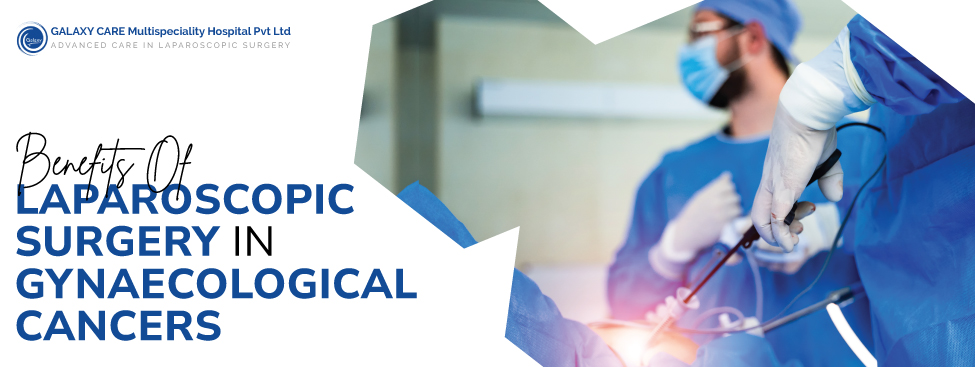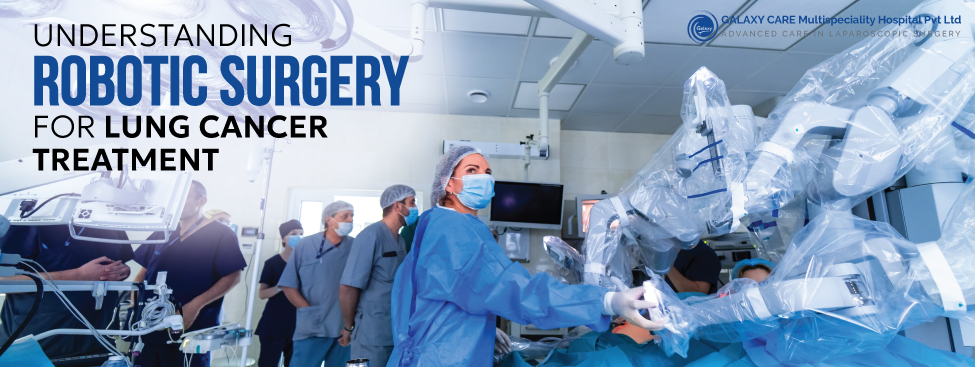
BENEFITS OF LAPAROSCOPIC SURGERY IN GYNAECOLOGICAL CANCERS
Gynaecological cancers refer to cancers that originate from a woman’s reproductive system. According to the World Health Organization, gynaecological cancers are among the most common cancers detected in women. Every year, over 6,00,000 new cases of cervical cancer and uterine cancer are reported globally. India bears a particularly high burden with new cervical cancer cases annually. These numbers translate to many lives lost to these preventable diseases.
Early detection and treatment are crucial to achieve positive outcomes. Various studies suggest that the Laparoscopic Surgery offers positive outcomes for gynaecological cancer patients. At Galaxy Care Hospital, our best Laparoscopic Cancer Surgeons perform hundreds of gynaecological cancer surgeries every year. Let us help you understand Laparoscopic Surgery and its benefits for gynaecological cancers in detail.
Understanding Laparoscopic Surgery
Laparoscopic Surgery, also known as keyhole surgery, is a minimally invasive surgical technique where surgeries are performed through small incisions rather than through a large incision. In this technique, a laparoscope (a thin tube with a High-Definition video camera) is inserted through one of the incisions to allow the surgeon to view the surgical site internally. Specialized surgical instruments are inserted through similarly placed small incisions to facilitate internal surgical procedures. This helps avoid a large and painful incision, leading to less post-operative pain, quicker recovery and improved cosmetic outcomes for the patient.
Common Gynaecological Cancers in Women
Here are the major gynaecological cancers:
Cervical Cancer – It begins in the cervix (lower, narrow part of the uterus). Caused by HPV infection, it can often be prevented by vaccination and screening.
Uterine/Endometrial Cancer – Starts in the endometrium (lining of the uterus). Common in post-menopausal women, linked to obesity and diabetes. Symptoms include abnormal bleeding.
Ovarian Cancer – Origins from the ovaries. Has vague symptoms thus often detected at advanced stages. Linked to family history, nulliparity, endometriosis. Deadliest of gynaecological cancers.
Vaginal Cancer – Rare, begins in the vagina. Usually occurs post-menopausally. Associated with vaginal HPV infection, prior cervical/vulvar cancer. Symptoms include abnormal bleeding or discharge.
Vulvar Cancer – Initiates in the vulva (external female genitalia). Majorly affects postmenopausal women. Prolonged irritation/infection can raise the risk. Appears as warts, sores that won’t heal.
Benefits of Laparoscopic Surgery in Gynaecological Cancers
Today, several gynaecological cancer surgeries are increasingly performed using the laparoscopic approach. Some of the key benefits of laparoscopic surgery in the treatment of gynaecological cancers include:
Reduced Morbidity
Due to smaller incisions, Lap gynae surgery causes less pain, minimal blood loss and faster recovery periods compared to open surgeries. This leads to reduced postoperative trouble and a quicker return to normal activities.
Improved Cosmetic Outcomes
The incisions made during laparoscopy are much smaller compared to open surgeries. This results in finer and less noticeable scars. The improved cosmesis is an added advantage, especially for cancer patients.
Magnified View and Precision
The laparoscope provides high-definition magnified stereoscopic views of the surgical field. Various Laparoscopic Gynae Surgeons in Pune and around the world use it to perform intricate surgical procedures with greater precision.
Minimal Impact Surgeries for Early-Stage Cancers
Laparoscopic surgery is used for surgical staging and tumour resection in early-stage cancers of the ovary, uterus and small cervical cancers. This helps achieve similar oncologic outcomes as open surgery but with minimal surgical trauma.
Shorter Hospital Stays
With reduced postoperative pain and quicker recovery, the average hospital stay for laparoscopy surgery is much shorter (2-3 days) compared to 5-7 days for open surgeries. This reduces the cost of treatment.
Conclusion
In conclusion, laparoscopic surgery brings several advantages over open surgeries for gynaecological cancers. It helps achieve similar oncologic outcomes with less postoperative pain and faster recovery. Experienced surgeons at Galaxy Care Hospital are highly skilled in various types of advanced Lap Gynae Surgery and can offer cancer patients the several benefits of minimally invasive techniques. Our state-of-the-art infrastructure and multidisciplinary team ensure optimum cancer management. Consider Galaxy Care Hospital for your gynaecological cancer care needs. Get in touch with us to book your appointment and get the best gynaecological cancer treatment in Pune!


